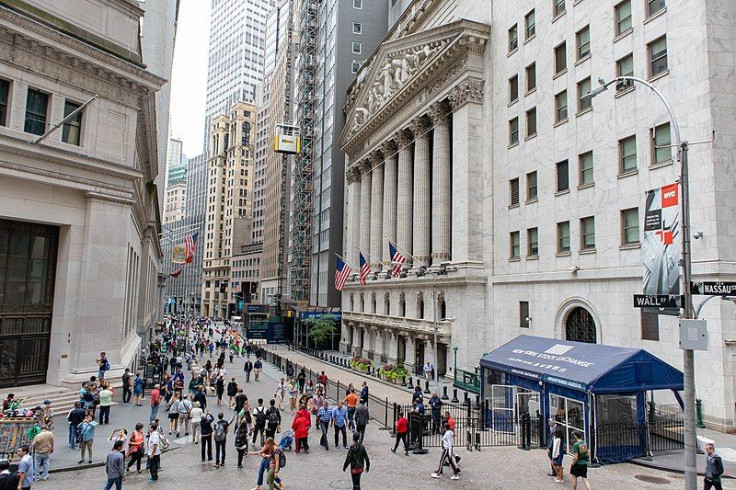Wednesday’s Stock Market Close: US Equities Plunge On Spike In New Covid-19 Infections, Oil Drops

KEY POINTS
- Arizona, Texas, Florida and Montana have seen a recent spike in covid-19 infections
- The International Monetary Fund said global GDP gross domestic product will shrink by 4.9% in 2020
- The Federal Housing Finance Agency House Price Index rose 0.2% in April
U.S. stocks tumbled on Wednesday as reports of new covid-19 cases in several states raised worries about when the economy can finally reopen. The International Monetary Fund also offered a grim outlook for the global economy.
The Dow Jones Industrial Average dropped 710.16 points to 25,445.94, while the S&P 500 fell 80.96 points to 3,050.33 and the Nasdaq Composite Index tumbled 222.2 points to 9,909.17.
Wednesday’s volume on the New York Stock Exchange totaled 4.86 billion shares with 356 issues advancing, 15 setting new highs, and 2,639 declining, with 12 stocks setting new lows .
Active movers were led by American Airlines (AAL), General Electric Co. (GE) and Inovio Pharmaceuticals Inc. (INO).
Florida said the number of confirmed covid-19 cases in the state increased by 5,508 on Tuesday, a record jump, and now total 109,014. The states of New York, New Jersey and Connecticut ordered visitors from certain hotspot states to quarantine themselves for 14 days.
Arizona, Texas and Montana have also seen a recent spike in covid-19 infections.
The International Monetary Fund said global gross domestic product will shrink by 4.9% in 2020 (a bigger contraction than its previous 3% estimate).
IMF also warned public finances will deteriorate as governments battle the coronavirus crisis.
“The Covid-19 pandemic has had a more negative impact on activity in the first half of 2020 than anticipated, and the recovery is projected to be more gradual than previously forecast,” the IMF said.
“The latest coronavirus news is not positive for the stock market which was betting the worst of the pandemic recession was behind us,” said Chris Rupkey, chief financial economist at MUFG. “All the hopes of investors looking for a better economy to improve the bottom lines of companies shut down in the recession have been dashed. Forget about the fears of the virus coming back in the fall, the number of new cases and hospitalizations in states like Arizona, Texas, and Florida says the threat is happening right now.”
“Airline stocks and transports are down, and oil tanked,” said Peter Boockvar, chief investment officer at Bleakley Advisory Group. “The regional quarantine sparked concerns about a dampening of activity as the economy in the region is just reopening.”
“Markets pause with all eyes on the virus and the reopening heading into the summer months,” said Gregory Faranello, head of U.S. rates trading at AmeriVet Securities. “The health side is back front and center as both monetary and fiscal liquidity has been factored in short-term. We have entered a new phase of this crisis.”
“The outbreaks have given markets the unpleasant reminder that the pandemic is far from over and that the economic recovery may be slower than expected,” said Mobeen Tahir, associate director of research at WisdomTree in London.
The Federal Housing Finance Agency House Price Index rose 0.2% in April from the previous month.
Overnight in Asia, markets finished narrowly mixed. The Shanghai Composite edged up 0.3%; Hong Kong’s Hang Seng fell 0.5%; while Japan’s Nikkei-225 slipped 0.07%.
In Europe markets plunged, as Britain’s FTSE-100 dropped 3.11%, while France’s CAC-40 slid 2.92% and Germany’s DAX fell 3.43%.
Crude oil futures dropped 6.17% at $37.88 per barrel, Brent crude slipped 0.42% at $40.36. Gold futures fell 0.35%.
The euro fell 0.5% at $1.1253 while the pound sterling dropped 0.83% at $1.2417.
The yield on the 10-year Treasury dropped 3.53% to 0.684% while yield on the 30-year Treasury fell 2.96% to 1.445%.
© Copyright IBTimes 2025. All rights reserved.



















